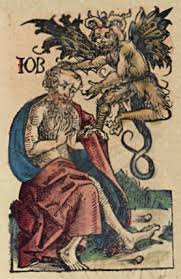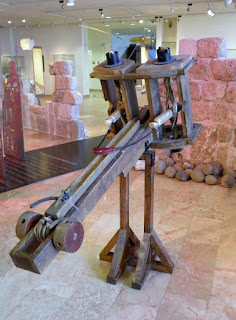JOB WAS THE RICHEST MAN AROUND, but in a single day he was wiped out. The Sabeans ran off with his asses and oxen and slaughtered the hired hands. Lightning struck his sheep barn and burned up the whole flock, not to mention the shepherds. The Chaldeans rustled his camels and made short work of the camel drivers. And a hurricane hit with such devastating effect the house where his seven sons and three daughters were having a party that there wasn't enough of them left in the wreckage to identify. What happened next was that Job came down with leprosy. And what happened after that was that he cursed the day that he was born. He said that if he had his way, it would be stricken off the calendar entirely and never so much as mentioned again. He prayed to die, but his heart went on beating. He prayed for the sun to go out like a match, but it kept on shining. His wife advised him to curse God and then go hang himself, but he stopped just short of that because he was a very good man and a very religious man and there were some lengths to which, even though he was almost out of his head with the horror of it all, he couldn't quite bring himself to go. And that was the crux of his problem—the fact that he was a very good and a very religious man and knew it. Why had God let such things happen to him? He had four well-meaning but insufferable friends who came over to cheer him up and try to explain it. They said that anybody with enough sense to come in out of the rain knew that God was just. They said that anybody old enough to spell his own name knew that since God was just, he made bad things happen to bad people and good things happen to good people. They said that, such being the case, you didn't need a Harvard diploma to figure out that, since bad things had happened to Job, then ipso facto he must have done something bad himself. But Job hadn't, and he said so, and that's not all he said either. "Worthless physicians are you all," he said. "Oh that you would keep silent, and it would be your wisdom" (Job 13:4-5). They were a bunch of theological quacks, in other words, and the smartest thing they could do was shut up. But they were too busy explaining things to listen. Eliphaz the Temanite proceeded to make a few helpful suggestions about some of the bad things that Job must have done and then let slip his mind. He must have robbed a few beggars of the rags on their backs, he said. He must have refused food to some poor soul who was starving to death. There must have been several widows and orphans he'd ground his heel in the faces of without stopping to think what he was doing. But Job didn't even dignify these charges by refuting them. He talked about God instead. There had been a time when God and he had been like that, he said, holding up side by side what the leprosy had left of two fingers. There was a time "when his lamp shone upon my head," he said, "and by his light I walked through darkness. When the Almighty was with me, and when my children were about me" (29:3,5), and then he had to stop for a few minutes and blow what was left of his nose before going on. The question, he said once he'd had time to pull himself back together, was where was God now? He had looked for him in front, and he had looked for him in back; he had looked for him to the right, and he had looked for him to the left; but he wasn't anywhere to be found. If he only knew where God might be keeping himself, he'd go tell him his troubles and get an explanation at least, but God had made himself scarce as hen's teeth, and looking for him was like looking for a needle in a haystack. "God has cast me into the mire, and I have become like dust and ashes," he said, too miserable to worry about mixing his metaphors. "I cry to thee, and thou dost not answer me," he said, "and with the might of thy hand thou dost persecute me" (30:19-21). It was the closest he had come yet to taking his wife's advice and calling him a sonofabitch. "My skin turns black and falls from me," he said (30:30) and then took advantage of a long speech by a friend named Elihu to change a few of his dressings. Elihu went over many of the same points his colleagues had already ticked off and then added the idea that the destruction of all Job's property, the death of all his children, and his leprosy were probably just God's way of helping him to improve his character and sharpen his sensitivities. "He delivers the afflicted by their afflictions," he explained, "and opens their ears by adversity" (36:15), but Job had no chance to respond to this new and comforting insight because at that point another speaker made himself heard, and this time the speaker was God. Just the way God cleared his throat almost blasted Job off his feet, and that was only for starters. It is the most gorgeous speech that God makes in the whole Old Testament, and it is composed almost entirely of the most gorgeous and preposterous questions that have ever been asked by God or anybody else. "Have you entered into the springs of the sea, or walked in the recesses of the deep?" he asked. "Where is the dwelling of light? Have you entered the storehouses of the snow, or has the rain a father? Can you bind the chain of the Pleiades? Who has put wisdom in the clouds or given understanding to the mists?" (Job 38 passim). And by this time he was just starting to get wound up. "Is the wild ox willing to serve you?" he asked. "Will he spend the night at your crib? The wings of the ostrich wave proudly, but are they the pinions and plumage of love? Have you given the horse strength? Have you clothed his neck with thunder, who says among the trumpets 'Ha, ha!' and smells the battle afar off? Does the hawk fly by your wisdom and stretch her wings toward the south?" (Job 39 passim). There was obviously only one thing for Job to say, and he said it. "Behold, I am of small account. What shall I answer thee?" he said, coming out with that one frail question of his own. "I will proceed no further" (40:3-5). But God wasn't through yet. You can think of God as a great cosmic bully here if you want, but you can think of him also as a great cosmic artist, a singer, say, of such power and magnificence and so caught up in the incandescence of his own art that he never notices that he has long since ruptured the eardrums of his listeners and reduced them to quivering pulp. "Have you an arm like God, and can you thunder with a voice like his?" he asked (40:9), and then he launched off into a devastating aria about Behemoth, the hippopotamus he had made, and Leviathan, the crocodile he had made, challenging Job or anybody else, if they thought they could, to take them for walks on leashes or pierce their armored hides with cold steel. You feel that God had only paused to catch his breath when Job saw his chance to break in again at last. "I have uttered what I did not understand, things too wonderful for me, which I did not know," he said (42:3). And then he said something else. All his life he had heard about God, about his glory and his holiness, about his terrible wrath and his great mercy, about the way he had created the earth and all its creatures and set the sun, moon, and stars in the sky so there would always be light to see by and beauty to gladden the heart. He had sometimes thrilled and sometimes trembled at the sound of these descriptions, and they had made such an impression on him over the years that not even the terrible things that had happened to him or the terrible question as to why they had happened or the miserable answers to that question proposed by his friends could quite make him curse God as had been suggested, although there were a few times when he came uncomfortably close to it. But now it was no longer a matter of hearing descriptions of God, because finally he had heard and seen him for himself. He had seen the great glory so shot through with sheer, fierce light and life and gladness, had heard the great voice raised in song so full of terror and wildness and beauty, that from that moment on, nothing else mattered. All possible questions melted like mist, and all possible explanations withered like grass, and all the bad times of his life together with all the good times were so caught up into the fathomless life of this God, who had bent down to speak with him, though by comparison he was no more than a fleck of dust on the head of a pin in the lapel of a dancing flea, that all he could say was, "I had heard of thee by the hearing of the ear, but now my eye sees thee; therefore I despise myself and repent in dust and ashes" (42:5-6). But God didn't let him despise himself for long. He turned to the garrulous friends and said, "You have not spoken of me what is right as my servant Job has" (42:7), with the clear implication that Job had been right in standing up to him, if only because it showed he was worth listening to, as his friends preeminently were not. And then he gave back to Job more riches than he had ever had before together with his health, and Job lived to have a whole new set of children and to see them through four generations before he died old and full of days. As for the children he had lost when the house blew down, not to mention all his employees, he never got an explanation about them because he never asked for one, and the reason he never asked for one was that he knew that, even if God gave him one that made splendid sense out of all the pain and suffering that had ever been since the world began, it was no longer splendid sense that he needed, because with his own eyes he had beheld, and not as a stranger, the One who in the end clothed all things, no matter how small or confused or in pain, with his own splendor. And that was more than sufficient.
Originally published in Peculiar Treasures and later in Beyond Words
Frederick Buechner (pronounced Beekner)
|


























